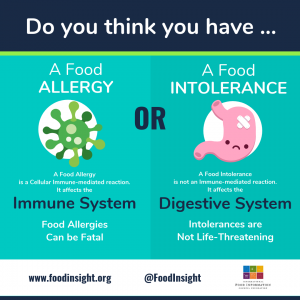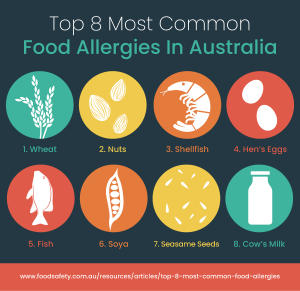Do you have any food allergies?
Did you know one in three people in Australia will develop an allergy at some point in their life? Commonly these allergies will be to food. This happens in around 10 percent of infants up to the age of 12 months and two percent of adults (A&AA, 2019).
May 22nd-28th is Food Allergy Week (FAW), which raises the awareness of food allergies – some of which are potentially fatal. So, let’s get to know allergies better and what this means for those of us who also have diabetes.
What is the difference between an allergy and anaphylaxis?
An allergy is where our body’s immune system overreacts to what we see as a safe substance. This can be medications, insect bites (eg. bee stings), environmental (eg. grass, change in weather) or food.
The most severe form of an allergic reaction is anaphylaxis. Anaphylaxis may affect breathing and the heart, and therefore if untreated can result in loss of consciousness or in some cases, death.
Anaphylaxis can typically be treated by using an EpiPen. It is important to discuss with your healthcare professional your best pathway of management and when to call for help as anaphylaxis is a medical emergency that in some cases can be fatal (A&AA, 2019).

What about food intolerances?
Often confused with food allergies, food intolerances do not affect the immune system. Rather food intolerances result from the body’s inability to digest or absorb components of foods (ASCIA, 2019). Intolerances may cause bloating, discomfort and other symptoms, but they will occur more slowly (for example the bloating you may feel hours after you drink your milky latte).
Unlike allergens, intolerances may still be tolerated in the diet up to a point (and this point will differ for everyone). When it comes to allergens, complete dietary exclusion is currently advised for those who suffer from an allergy, due to potential life-threatening consequences (ASCIA, 2019).
Symptoms of an allergic response
Symptoms can be mild to severe, as everyone reacts differently. A reaction can include swelling, itching and rashes on the skin, stomach pain, vomiting and diarrhea, and/or tightness in the throat, shortness of breath, or wheezing (ASCIA, 2019).

Do you know the most common “allergen” foods?
The most common allergen foods in Australia as are egg, cow’s milk, wheat, soy, peanut, tree nuts, fish, shellfish and sesame (ASCIA, 2019). As recommended by the National Allergy Strategy, early introduction of common allergenic foods to infants (around six months, before 12 months of age) can assist with minimising the onset of food allergies.

Managing diabetes and food allergies together
Managing diabetes with a food allergy or an intolerance may seem daunting at first but there are strategies that can be put into place to ensure you minimise your risk, yet still get all the nutrients you require. It is all about becoming well informed with the types of foods you can have, should you have an allergy or intolerance. It is best to talk to your GP as well as a qualified dietitian who can assist you with alternatives.
Authors: Tamara Wolf, Caitlin Pye, Maggie Wang & Danyu Yang – University of Queensland Masters of Dietetic Students
References:
https://allergyfacts.org.au/allergy-anaphylaxis
https://allergyfacts.org.au/faw
https://www.allergy.org.au/patients/food-other-adverse-reactions/food-intolerance
https://www.allergy.org.au/patients/fast-facts/food-allergy – (ASCIA, 2019)
https://foodinsight.org/food-allergy-or-intolerance-whats-the-difference/ (Picture)
https://australia.universalmedicalid.com/allergy (Picture)
https://www.australianallergycentre.com.au/types-of-allergy/food-allergy/ (Picture)
https://preventallergies.org.au/










